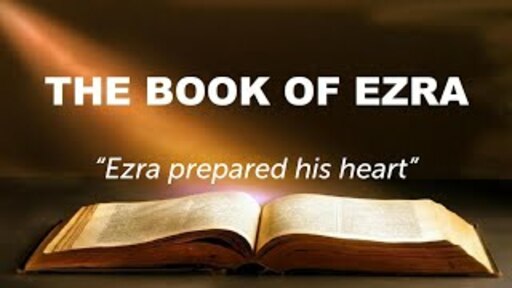The Book of Ezra
EZRA
Introduction:
Central Message: Prepare the heart to study and serve God.
Key Passages: Ezra 7:10, Ezra had prepared his heart to seek the Law
of the Lord, and to do it, and to teach statutes and ordinances in Israel.
Ezra 3:11, And they sang responsively, praising and giving thanks to the LORD, “For He is good, for His steadfast love endures forever toward Israel.” And all the people shouted with a great shout when they praised the LORD, because the foundation of the house of the LORD was laid.
Summary: The book of Ezra records the return of 2 groups – the 1st led by Zerubbabel to rebuild the Temple (1-6) with 50,000 people. The 2nd led by Ezra with 2,000 families to rebuild and strengthen the spiritual condition (7-10) of the people now living in Jerusalem. Sandwiched between these two returns is the story of Esther who lives and rules as Queen of Persia for 60yrs. Ezra’s name means “Help” and originally it was bound together with Nehemiah. Haggai is the prominent prophet during the time of Ezra.
“Ezra” comes from the author. He changes from 3rd person to 1st
person in chapter 7. Ezra was a priest and a leader of the 2nd return from Babylon Captivity. The purpose is to record events of the return to build the Temple and reconnect Israel to God.
Writer: Ezra written 460-440BC.
Date of Events for Ezra: (538-438BC) – 100yrs.
Themes:
1. The history of Israel following the 70yr. Babylon Captivity.
2. The leadership of Zerubbabel and Ezra in rebuilding Temple & People.
3. Purity of soul and obedience to God are primary in renewing hearts.
4. God is at work throughout the world, even in and through pagan kings.
Quotation: Ezra was devoted to God's Word. As a scribe, he gained knowledge and wisdom through intense study of the Scriptures. Obeying
God's commands became the guiding force of Ezra's life and he set the
pattern for the rest of God's people through his spiritual zeal and dedication to prayer and fasting. M. Fairchild
Everything in our service for the Lord is dependent on His blessing. The meeting of need does not depend on the supply in hand, but on the blessing of the Lord resting on the supply. Do we really prize the Lord’s blessing? W. Nee
Interesting Facts:
1. Pagan Kings decide to help out the endeavor to rebuild the Temple even though they do not become believers in the God of Israel.
2. All three books represent a wide difference in opinion about crucial matters. In Ezra, trusting God requires that God’s people travel through dangerous territory without a royal escort. In Nehemiah, the offer of a royal escort is taken as evidence of God’s blessing. Ezra represents what might be called “idealistic faith,” while Nehemiah practices “pragmatic faith.” In Esther, God’s hand is hidden, revealed primarily in Esther’s shrewd use of her wits and position in the service of her people. We could call hers a “clever faith.”
3. Each leader has a different problem and it is solved different ways. Sometimes trusting in God means not relying on human help.
4. The 70yr. Babylonian Captivity lasted from either 605-535BC noting the Returns or 586-516BC for the Temple destruction/rebuild. (Jer.25:11; Dan.9:2; Zech.1:12)
The Persian Empire at the time of Ezra – 458BC ESV Study Bible
Book Outline
1. First Return: Cyrus permits the first group of exiles led by Zerubbabel (1-2)
2. Rebuilding the temple (3)
3. Opposition to the rebuilding (4)
4. Renewal of the temple (5-6)
5. More Recruits: Ezra leads more exiles to Jerusalem (7-8)
6. More Regrets: Ezra deals with the problem of mixed marriages (9-10)
Simple Outline
1. Restoration of the T__________ (1-6)
2. Reformation of the P___________ (7-10)
Overview: Our God fulfills His promises to His children and rebuilds worship and reforms lives for His glory and their good.
Sermon: God is Greater… – Ezra
1. than A _____________ History (2Chron.36:15-17)
2. than A _____________ King and Nation (1:1; 6:1; 7:1)
3. than A ___________ Resistance (4:1)
4. than An ____________ Decision (9:1)

